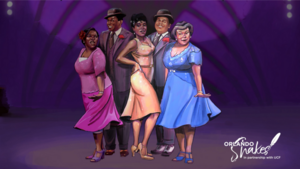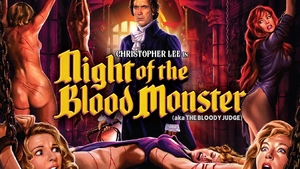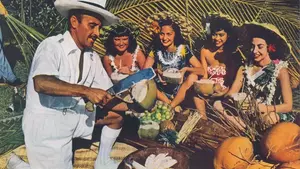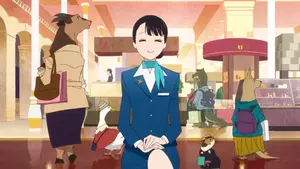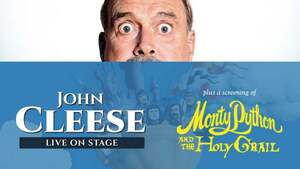He Sells Sanctuary: An Interview with Ian Astbury of
The Cult
Gail Worley
“cult”
In the late ’80s – following a series of name changes and stylistic redirections – England’s goth/psychedelic/ metal rockers the Cult hit it big with their debut album, Love, and its successor, Electric. Fronted by handsome and charismatic lead vocalist Ian Astbury, the Cult influenced both fashion trends and radio play-lists. Unfortunately, dissention among band members and uneven commercial success foreshadowed their break-up in 1995. Although Astbury reformed the Cult with co-founder/guitarist Billy Duffy in 1999, there’s currently a hotbed of activity surrounding the Cult, the likes of which they’ve not seen before: a new record deal, a recently-released greatest hits package, an upcoming tour with Jimmy Page and the Black Crowes, and Astbury’s first solo album, Spirit Light Speed, released in July. According to the 38-year-old Astbury, “It’s all coincidental. Everything just fell into the same place.”
During a period of downtime before their current career resurrection, Astbury found personal sanctuary while traveling in Tibet, Nepal, and Cuba. “I hadn’t traveled on my own since I was probably eighteen,” he says, “so I took advantage of the situation.” A few days before the domestic release of Spirit Light Speed, Astbury spoke from his home in Los Angeles about his impressions of Tibet and Cuba, his spiritual path, the long, strange trip of a career he’s had with the Cult, and some things that may surprise even the most devoted Cult Fans.
• •
What did you take away from your experiences in Tibet that’s stayed with you?
I think, really, the whole West versus Eastern lifestyle [was pretty interesting]. I’ve been at both ends of the spectrum. I’ve had million-dollar bank accounts, as well as been homeless, panhandled about bus stations – very Western experiences. When you go to Tibet, you see people with very little, but what they have a lot of – and in this way they’re very wealthy – is spirituality. I think more than anything else, that’s what really struck me: how generous and how warm the people I encountered were. Although there are a lot of very warm, passionate people in the West, it takes awhile to get to know people. Tibetan people, straight away, are just straight into you. I really felt that I’d found a place of refuge because, the way that I was brought up, because of my ideas or whatever, I couldn’t really find any place that I could call home. In Tibet, in a lot of ways, it felt like I’d gone home.
Your music has always had a spiritual or majestic feel to it, like you’re keyed in to a very deep spirituality. Do you follow any particular spiritual practice yourself?
I find myself gravitating towards a lot of different aspects of Buddhism, Zen, Chinese, as well as the Tao. I’m also very interested in Western traditions as well as Wicca, Paganism, and various forms of goddess worship. Whatever I have in my life, I just want to enrich myself. I think, in a lot of ways, people are looking for spiritual authenticity, not only in the arts but in general life. It’s something that really makes me feel that I’m alive and [that the daily grind is] not so important.
When Love came out, it was so psychedelic and perceived as this concept of a throwback to the ’60s vibe. Then Electric came out, and you guys sounded like AC/DC. I love both of those records, but the band just completely changed the whole concept of what the Cult was about. Do you think a lot of fans thought that you were going to completely reinvent yourselves – visually and musically – with each album?
I think that did happen. One aspect of the Cult is very spiritual and a very “love and peace” vibe, and the other side is very masculine and very powerful. I think that when you get the balance right, [the same aspects can come through together]. Between Love and Electric, a lot of transitional things were happening. The Love album was created out of a very sort of oppressing time, during Thatcher’s Britain. [There was] a lot of unemployment and a lot of blight and social upheaval and pain – lots of people standing on bread lines. Out of all that energy, so much negativity, we all had to find a way out. So there was that obsession with a lot of late-‘60s ideals, exploring other realms of consciousness. One of the things going on in London at the time was a club called Alice Underground.
I’ve heard of it.
It was an incredible catalyst for some of the people. You’d go down there on Monday night – it was held on Monday for some strange reason – from nine to like three in the morning, and there were all sorts of characters and musicians of that time down there. The Cure, Depeche Mode, Jeffrey Lee Pierce of the Gun Club, lots of others. A lot of the musicians and fans were dressed in clothing – I don’t want to say ’60s style, because a lot of the stuff was very tribal – with a lot feathers and face paint and Celtic motifs. It was quite psychedelic, but the scene had some peculiarities where the Age of Avalon and Arthur, the Druids and ancient British Celtic [traditions] were coming into play. Every Monday night, that was the place to be. And out of that energy, the Love album grew. But then, you do a world tour and you come back to England and you find the same dissonance had grown further and that whole kind of shallow ground is what you’re still standing on. The initial Electric album was recorded in more of that psychedelic fashion, the atmosphere was more like what was going on when we recorded Love. I mean, the Electric album still had those “fairy realm” aspects to it, but by that time, we’d already been out in the real world and that darkness found its way into what we were recording.
The Cult signed a deal with Atlantic Records last year. Where are you in the process of making a new Cult record?
Myself and Billy (Duffy) have spent the past 10 months trying to cultivate a new pool of resources for our next album. We’re just beginning to define what our instrumentation will sound like, what will work for both of us. I mean, there’s the guitar, OK, we’ve got that one down. But what does the guitar do now? Well, a guitar does so many different things now. You can tune your guitar to do massive things, and you can de-tune all your strings. You have huge, whole genres of music that have opened up based on that kind of new level of tonality. It’s strange, but if you don’t de-tune your guitar today, your music will sound very dated. It really does affect the music because as soon as you hit that chord, kids know the difference between what’s authentic and what’s unauthentic.
How has the dynamic between you and Billy changed since you disbanded and decided to reform?
We talk to each other, that’s about it. At the time we broke up, he didn’t know who the hell I was. He had no idea.
Were you pretty involved with drugs at that point?
I was cultivating a nice healthy drug habit, yeah, and at that particular time, he wasn’t [doing drugs]. But we’re like your run-of-the-mill adventurists, we’d try anything once. We were like day-trippers, we were never really hardcore users, never have been. Drugs, when they’re working for you, it’s wonderful. When they not working for you, forget about it. Drugs are really an individual choice, I don’t want to spout philosophical about “drugs are evil” or anything like that. They had a place in my life. The first time I took LSD was a really monumental experience in my life. Seeing that altered state, being in an altered state of consciousness, that, once I’d experienced that, I realized there was no turning back.
One of the things that stands out about Spirit Light Speed is it’s real rock and roll with some intellectual depth behind it. The record does have a feeling of what you’ve done with the Cult, probably because you have such a strong and easily identifiable voice. How does the material on this record differ from a project you could do with the Cult, or when you were doing the Holy Barbarians?
The Holy Barbarians was like a load of adolescent teenagers: get in a van, drink beer, take drugs, and supposedly get yourselves in trouble around Europe and the United States. I mean, we got out of order. I quit the Cult and joined the party and basically went on a rampage for a year and a half. We were a naughty bunch of little boys [laughs], going around, causing trouble everywhere and having a real riot with sort of a light glam influence, whimsical English pop-music melodies and late ’60s/early ’70s period Bowie influence. That’s what I wanted to do. We really had a riot. People would come to the shows, Cult fans and stuff, they would hear that I was performing, and we’d do all these Barbarian songs, then we’d do “The Witch” and “Wild Flower” and people would just go insane. It was great, to escape from the Cult and all of that corporate structure, etc. Once I got all of that out of my system, I decided I was ready to [reform the Cult] again.
“High Time Amplifier” is a really very powerful song with some fairly enigmatic lyrics. What’s that all about?
I guess it’s like a kind of Crowley mantra, “Love is the Law. Do what thou wilt shall be the whole of the law. Love under will.” I kind of believe in that, that Love is the Law. It’s a very simple mantra, really. You know, it’s really not about the sonics involved. The title “High Time Amplifier” came off a photograph of Pete Townsend playing a Hi-Watt amplifier. I just thought to myself, “Oh, he plays a Hi-Watt amplifier.” Then I wrote down “high watt amplifier” and it became “high time amplifier.” I thought, “That’s kind of cool.” It’s the whole idea of [quoting lyrics] “Love is on the rise,” and I mean that not in just a romantic sense, but as the kind of energy that comes up that you can’t repress. It’s coming up now in the Aquarian Age and the New Age and with the onset of spirituality and the spiritual aspects that are coming up – you cannot repress it.
How did you get involved in the Gone in 60 Seconds soundtrack?
An A&R guy from our record label said “Your album’s not coming out until February, what are you doing in the meantime?” and we were like “Uh, we don’t know.” And he was like, “Well, how about if you record this song for this new movie and do a video?” and we were up for the idea. So we were given this song “Painted on My Heart” written by Diane Warren. I had heard Stephen Tyler’s version of it and didn’t think it was something I could sing. The lyrics weren’t something I could see myself singing. But I listened to it again and there was a chord progression that I liked, where it was kind of somber, and I thought that there was something I could do with it. So we did it, and it actually turned out alright. The lyric is certainly not what I would have chosen, but I found myself getting into it. I just thought of it as an advertisement, but it seems to have taken on a life of its own.
I have to ask: Why did you decide to put Che Guevarra (famous Cuban guerilla leader) on the cover of Spirit Light Speed?
It’s not Che, it’s me.
Well, it looks like Che. Is that an accident?
Having said that, Che is one of my all-time idols. My youngest son’s name is Che. When I left on my pilgrimage to Cuba, I had read a biography on Che and found out the fact that we actually have the same birthday.
What else did you like about Cuba?
The people are so generous. It’s amazing, you’re walking down the street and there’s freaking packs of people just visiting and listening to music. And the plaster is cracking, the cars are all from the ’50s, everything’s held together with tape and string, children walking around with bare feet or with cheap plastic shoes, kids don’t have any toys. You know, girls and boys walk around holding hands everywhere, there’s great romance. Girls would just come and wink at me and, like, grab your arm, and run away, laughing and giggling. There’s a great flirtatious nature. So you’re there and you’re thinking about Hemingway and you’re thinking about Che and the whole romantic aspect of Cuba, that’s what I liked. Their way of living, I don’t know what it is, what it has, but it sure beats being at home, with a bag of Cheetos, watching The Simpsons [laughs]. They don’t love TV, they just love each other. It’s sensual, really sensual. Oh, right! I didn’t want to come back. I’d have been very happy to stay there, except I’d run out of money. Like an idiot, I’d gone over there with an American credit card, which is basically no good. If you come with cash, dollars, no problem. American Plastic? Forget about it. Plastic from any other country is no problem, but American plastic, they aren’t having it. I think when I got on the plane I was down to my last $4.38, but I was walking around with $12 in my pocket for like four days. It was awesome. ◼

